This article was co-authored by wikiHow Staff. Our trained team of editors and researchers validate articles for accuracy and comprehensiveness. wikiHow's Content Management Team carefully monitors the work from our editorial staff to ensure that each article is backed by trusted research and meets our high quality standards.
This article has been viewed 114,724 times.
Learn more...
If you’re an actor, you may find yourself auditioning to play a German character. In this case, you’ll need to modify some core consonant and vowel sounds to make your speech sound more authentically Germanic (although you won’t actually be speaking German). Most importantly for English speakers, the German language has no “w” or “th” sounds. Try to keep your mouth compact and closed, and enunciate mostly with your lips. Doing this will help raise your vowel sounds so they match German pronunciation.
Steps
Altering Consonant Sounds
-
1Change the “w” sound to a “v” sound. German doesn’t have a “w” sound, and you’ll sound inauthentic if you make this sound while attempting to speak with a German accent. For example, pronounce the word “water” should like “vater.” Or, if you want to say that you “want to wet your whistle,” pronounce it like, “I vant to vet my vistle.”[1]
- Change the “w” pronunciation even if it’s in the middle of a word. For example, “jewelry” in a German accent would sound like “juvelry.”
- If a word already has a “v” in it—like “veterinarian”—you can pronounce it as you normally would.
-
2Articulate the letter “s” like a “z” when it occurs within a word. When you’re using a German accent and come across words with an “s” in the middle, change the sound to a “z.” For example, if you’re saying the word “also” with a German accent, pronounce it like “alzo.”[2] Of course, this is somewhat uncommon, since “s” is used most often at the end of English words.
- When the letter “s” occurs at the end of a word, don’t change it to a “z” sound. For example, the word “hiss” should sound the same whether or not you’re using a German accent. Don’t say “hiz.”
Advertisement -
3Enunciate a German “r” by gargling it slightly in the back of your throat. This is a little difficult, since the sound doesn’t exist in English. The German “r” sound comes close to the sound of an English “gh” or “rh,” but takes place far down in the back of the throat. Try to pronounce the “r” at the top of your esophagus, just about where you’d gargle water. The sound of a word like “rabbit” should resemble “hrabbit” or “ghabbit.”[3]
- As another example, the English word “run” should sound like “hrun” or “ghun.”
-
4Form the German “h” sound far back in your throat. Similarly to when you’re pronouncing “r” with a German accent, the letter “h” should be slightly rolled or gargled in the back of your throat. If you’re struggling to figure this sound out, try making a soft “g” sound before you pronounce the letter “h.” So, the word “hair” would sound like “hghair.”
- To put it a little coarsely, the German “h” sound mimics the sound you’d make if you were trying to gather spit in the back of your throat.
-
5Pronounce consonant sounds with the tip of your tongue. This will harden the consonants. When a word ends with a soft consonant, German language speakers have a tendency to make the sound hard and abrupt, unlike in English. Harden your consonants shortening the consonant sound and making it more abrupt in the back of your throat. Soft consonants include “g,” “d,” and “b.”[4]
- So, words like “pug,” “loud,” and “cub,” should be pronounced like, respectively, “puk,” “lout,” and “cup.”
- Be aware that these consonant shifts can lead to confusion. For example, “loud” and “lout” are both English words but have very different meanings.
Changing Vowel Pronunciations
-
1Voice long vowel sounds high in the back of your mouth. English speakers are used to pronouncing most long vowel sounds relatively low in their throats. This is most noticeable with the long “a” sound but applies to all long vowel sounds. When using a German accent, pronounce the long “a” more like a short “e.” To achieve this effect, slightly constrict your throat and pronounce the “a” sound from the back of your mouth.[5]
- For example, the word “cat” will sound like “kit” or “ket.” The proper noun “Kate” should be pronounced like “Ket.”
-
2Enunciate the short “i” like an “e” sound. Similarly to the long vowel sounds—and especially the long “a”—the short “i” sound should be pronounced from higher up in the back of your mouth. The intonation of this vowel sound also needs to become a little more nasal than in English.[6]
- For example, the words “winter” and “different” both use the short “i” sound. With a German accent, they would sound like “veenter” and “deeferent.”
-
3Pronounce the double “oo” sound like a short “u.” In a word like “book,” the English “oo” sound is pronounced from relatively deep in the throat. To change your speech for a German accent, tighten up this vowel sound so that it resembles a slightly nasal “u” sound. Try to keep your mouth closed relatively tightly when pronouncing this sound with a German accent.[7]
- For example, words like “wood,” “cook,” and “took” would be pronounced like “vud,” “cuk,” and “tuk,” respectively.
Modifying Letter-Combination Sounds
-
1Pronounce the English “th” sound like an “s” or “z.” German language speakers never pronounce the “th” sound like English speakers do in a word like “this” or “that.” In German, the “th” sound becomes flattened into a less-complex “z” or “s” sound. You can choose between either of these sounds when modifying the “th” sound. Or, try out both and see which sounds better to you.[8]
- So, pronounce “this” like “zis” and pronounce the word “thick” like “sick” or “zick.”
-
2Articulate the “ng” letter combination with a “k” sound. This occurs most frequently in the English present perfect tense, when many verbs take an “ing” ending. To pronounce these words with a German accent, drop the “ng” sound and replace it with a “k.” So, “thinking” and “wishing” become “thinkink” and “vishink.”[9]
- If it helps, think of it as swallowing or barely voicing the “ng” sound. You can also think of it as changing the soft “g” sound into a much harder “k” sound.
-
3Say the “dg” sound so that it resembles a “ch” sound. In English, “dg” makes a low “j” sound that occurs mostly in the back of the mouth. To take on a German accent, push the sound forward and up in your mouth so it’s pronounced with your tongue against the roof of your mouth. The resulting sound should resemble the English “ch” sound.[10]
- This sound commonly occurs in English words like “judge.” When you say this word with a German accent, it’ll sound like “chudge.”
- As another example, the word “German,” when spoken with a German accent, should sound like “cherman.”
Warnings
- Outside of an acting-related context, mimicking a German accent can be seen as offensive. Even if your group of friends finds a German accent funny, it could offend or hurt the feelings of others who overhear your accent. So, avoid putting on a German accent in social settings.⧼thumbs_response⧽
References
- ↑ https://learnoutlive.com/german-accent/
- ↑ https://learnoutlive.com/german-accent/
- ↑ https://www.germanlw.com/r-pronunciation/
- ↑ https://learnoutlive.com/german-accent/
- ↑ http://jackytappet.tripod.com/german.htm
- ↑ http://jackytappet.tripod.com/german.htm
- ↑ http://jackytappet.tripod.com/german.htm
- ↑ https://youtu.be/dBoiSLyjHrU?t=40
- ↑ https://youtu.be/dBoiSLyjHrU?t=40
About This Article
If you want to do a German accent, change any “w” sounds, which German doesn’t have, to “v” sounds. For example, you should pronounce “water" like “vater.” Since the German language also doesn’t use a “th” sound, swap any instances of it with an “s” or “z” sound. For instance, you would say “thick" like “sick” or “zick.” In addition to swapping these sounds, say the letter “s” when it’s in a word like a “z.” As an example, you should pronounce “also” like “alzo.” When you’re saying a word with "ng" in it, pronounce this letter combination like a "k" sound, so you would say "thinking" as "thinkink." For more tips, including how to make long vowel sounds high in the back of your mouth so you have a German accent, read on!
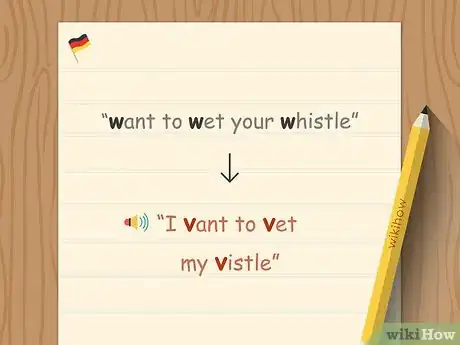
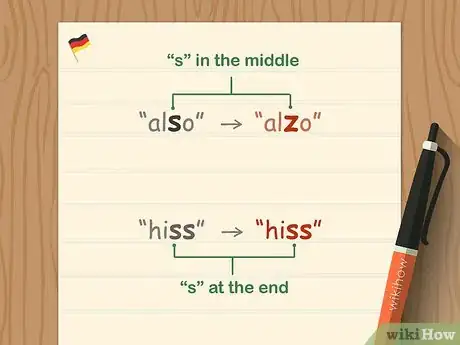
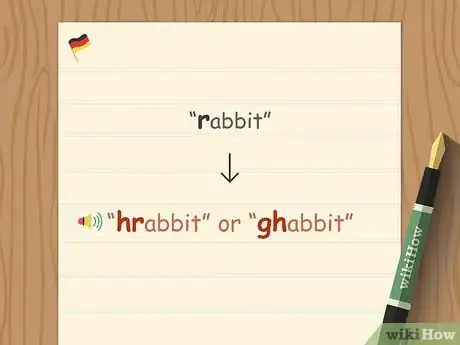

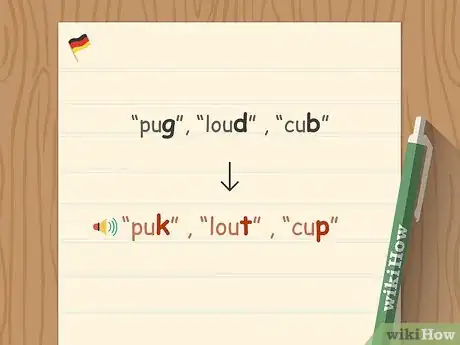

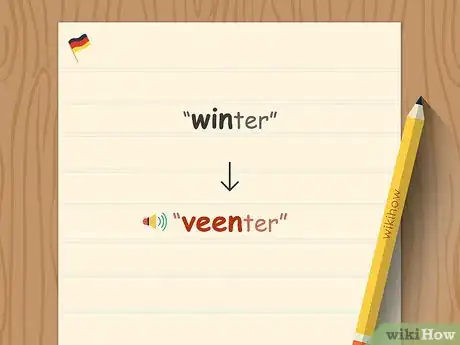

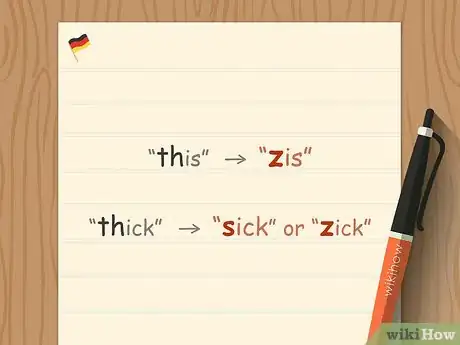
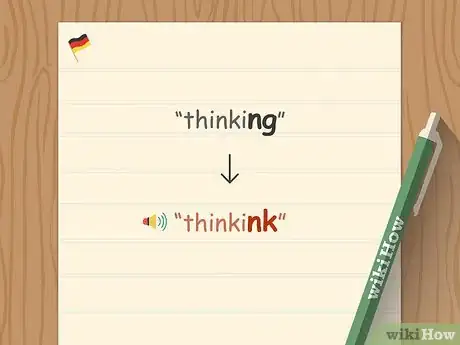
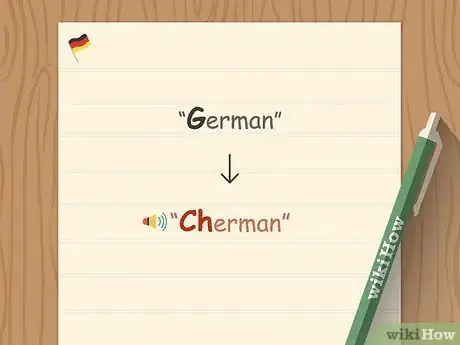













-Step-10-Version-2.webp)















































